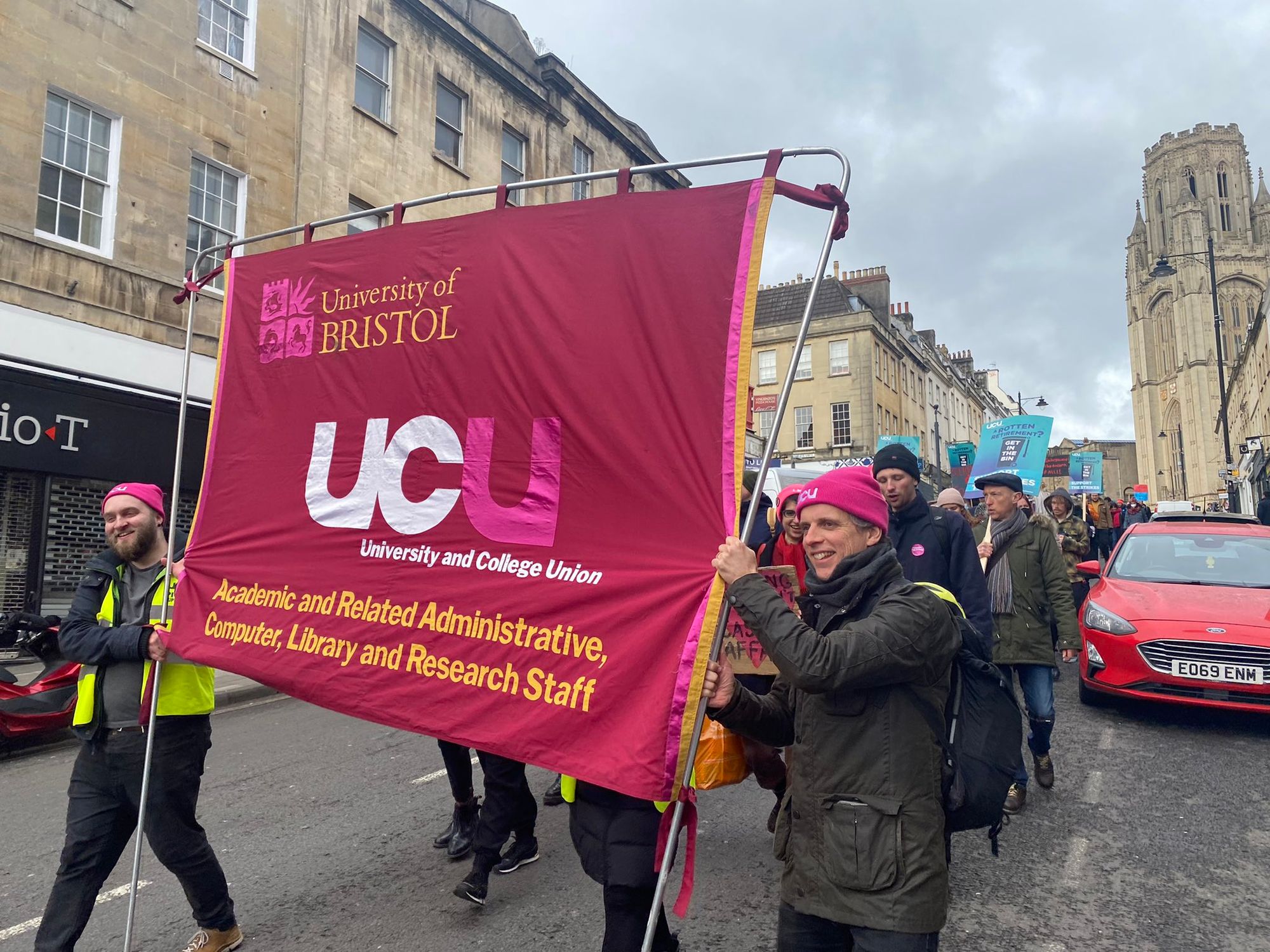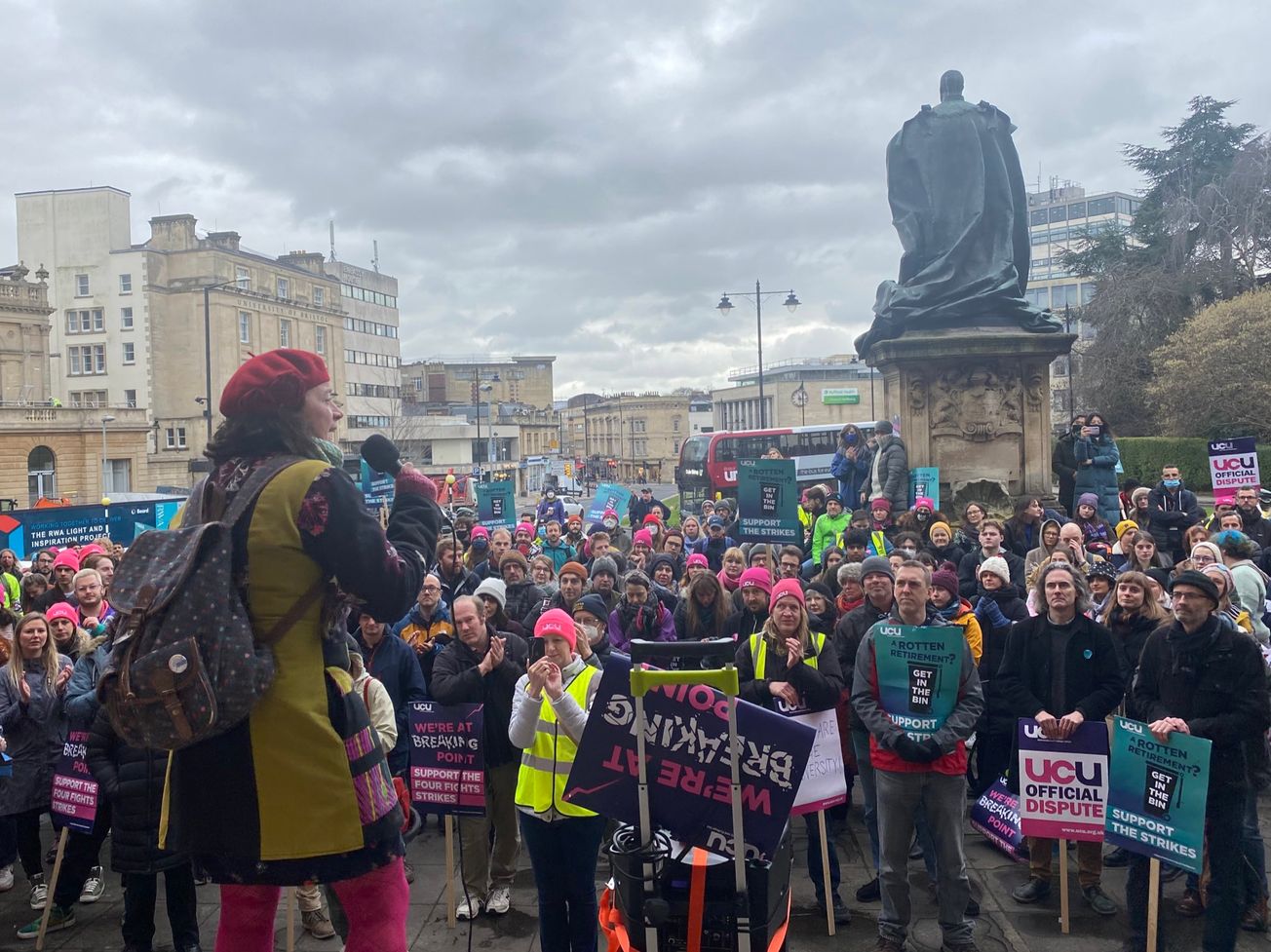By Evelyn Heis, Co-Deputy Film & TV Editor
What began in May 2018 as a series of strike actions over pensions initiated by the University College Union (UCU) has continued to remain prevalent, despite intervention from the Covid-19 pandemic. Just last term, staff from 58 universities, including the University of Bristol, took part in the three-day industrial action from 1-3 December. The UCU induced strikes work towards disputing the staff’s pension cuts, a result of the Universities’ Superannuation Scheme (USS), gender and ethnic wage gaps and to improve job security through stable work contracts.
This academic year, however, the UCU organised ten days of strike action across the UK to target the Four Fights disputes. Commencing on 14 February, staff at 44 universities reclaimed control and walked out of campus to come together at the picket lines, peacefully marching, rallying, and taking part in ‘teach outs’ to reduce the disruptions strikes pose for students.
Uni staff on the picket line outside the School of Geographical Sciences: Bristol Uni’s failure to meet UCU demands despite the institution’s £80 mil surplus ‘really sticks in the throat,’ says one @EpigramPaper pic.twitter.com/sAfQbhDEHV
— Megan Evans (@megan_e_evans) February 21, 2022
This ten-day striking period aims to, once again, urge universities to protect staff benefits and resolve the aforementioned pension dispute and wage cuts. The first week of the strike action (14-18 February) solely dealt with the USS pension dispute, while the second week of the strike action (21-22 February) focused on the discourse to improve the pension, pay, and working conditions which have remained in place for the past twelve years, with a total of 68 institutions across the UK standing together in solidarity. Week three of the strikes, spanning the period from 28 February to 2 March, will prioritise the pay and working conditions disputes, with a total of 63 institutions participating in UCU industrial action.
Despite the evident support and incentive for staff to take part in the strikes, there are significant hurdles in place to steer them from doing so. PhD student-teachers, for instance, are unable to take part in the strike action, while professors who do so are not paid for the time that they take to strike for better wages.
Senior Lecturer in English Literature, Cathy Hume, expressed her concerns over the strike actions when approached by Epigram. ‘First, I should say that like most of my friends and colleagues, I am reluctant to strike, not only because it means losing 10 days’ pay but even more so because we have all been through so much disruption in the last couple of years and just want a normal term of teaching where we are all together in seminar rooms. However, university employers both at Bristol and across the whole country are so intransigent that striking has become the only option left for us.’

‘The UCU’s demands are fair and reasonable. We want a pension that gives us enough to live on, rather than accepting the drastic cuts employers are proposing. The pension scheme administrator, USS, has said that UCU’s proposals are affordable. But university employers have so far failed to engage seriously with these proposals and allow us to call off the strike’.
‘At the same time, they’re refusing to even discuss sector-wide work to address impossible and unhealthy workloads, gender, ethnic and disability pay gaps, and casual contracts that mean around a third of university staff do not have secure jobs. All of that’s before we even get on to pay. If our pay had kept pace with inflation over the past 12 years, I would be earning £10,000 more than I am now, and my situation is not unusual’.
This discontent was similarly shared by another English lecturer at the University, Steve Bull, who disclosed his experience working fractional, fixed-term contracts for the University and the lack of stability this warrants. ‘I’m choosing to strike because the current expectation placed on university staff in terms of workload is unsustainable,’ he said, ‘I’m exhausted and at the same time it feels like the University isn’t valuing the work I am doing’.
‘This is my fifth year working fractional, fixed-term contracts for the University. I have no job security and no ability to plan for the future. I love doing what I do, but it’s becoming increasingly difficult because of the lack of care that is being shown to the staff who help to keep this University running’.
When in conversation with Bristol students about how they have felt regarding the UCU strikes, most of the student body responded in accordance with staff demands. However, many expressed their frustrations towards the disrupted learning periods brought on by the strikes, given the previous disruptions to their education as a result of the pandemic.
Second year English student, Milo, stated that, ‘Through this strike I have come to understand the pressing need for change in teaching within higher education. If anything, this period away from campus has allowed me to engage directly with information regarding the gender and ethnicity pay gap and the unmanageable contract conditions within Bristol University in particular.’
'I’m exhausted and at the same time it feels like the University isn’t valuing the work I am doing’.
‘Any annoyance felt within this week was directed towards the University itself, rather than the teaching staff, whose organisations of ‘teach-outs’ not only solidified a union within the student body but provided invaluable information regarding issues so often neglected by the University curriculum.’
In a similar vein, second year student Nicole, added that, ‘I can’t fault the staff for striking - it’s a response to a larger issue. I think that even though we may have had some disruption in terms of seminars, ultimately this is a result of a systemic issue, and I fully support staff in their actions. If a bit of disruption to our timetables is necessary to ensure that our tutors have stability and security, then we will stand by them.’
However, other students expressed their deep frustrations with the strikes and the University’s lack of response to the UCU’s demands, claiming that perhaps alternative responses could have been considered as to not disrupt their learning further.
Prospective students and parents, take notice of what universities are saying and doing about #UCUstrike If they say that they can't afford to maintain staff pensions, that zero hours contracts for staff and constant precarity are good for the 'student experience' ask why
— Sarah May (@Sarah_May1) February 20, 2022
A joint-honours French and English student, Niamh, voiced her concerns with the interruptions to teaching; ‘Generally, I’m a big advocate for protests and strikes because they’re usually borne out of a place of deep frustration and desperation, where clearly something is gravely wrong with the system they’re striking against. However, I do feel as though the students are suffering massively as a result, which isn’t fair at all, considering the number of COVID-19 disruptions we had last year and this year.’
This sentiment is shared by other students, including second year English student, Eden, who stated that, ‘I completely support the reasons behind the strikes; it’s just frustrating that we’re facing even more disruption to teaching after all the disruption that COVID-19 has already caused.’
Another anonymous student also felt that the strikes have been a ‘hindrance to [their] routine’, especially considering they are paying to attend the University. However, the anonymous student showed their solidarity with professors, saying that, ‘I support the strikes, as I’d like to be a teacher myself and my dad is a professor also,’ but they remained ‘disappointed with the University’s lack of online resources as a substitute.’
Dr Neil Davies, Bristol’s UCU pensions officer, encourages crowds to ‘show appreciation’ for students and supporters in the crowd at #UCUstrikes pic.twitter.com/pjTJNnmB0Z
— Epigram (@EpigramPaper) February 14, 2022
While it is undeniable that that the UCU’s strikes have disrupted students learning, this factor only adds further friction to professors’ decisions to take part in the industrial action. Senior Lecturer in English, Edward Holberton, acknowledges students’ frustrations and the impact this has on their education, stating, ‘We don’t take strike action lightly, especially given the disruption that has already been caused to this generation of students by the pandemic, but the issues that we’re striking about impact students as well as staff.’
‘We’re striking to make universities fairer and more inclusive, and by striking over workload, casualisation and pensions, we’re striking about issues which directly impact the level and quality of support available to students.’
Behind the picket lines: speaking to striking university staff
Opinion | Should students cross the picket line?
The final week of the strike action is taking place between 28 February until 2 March.
Featured Image: Epigram / Holly Beaumont
How do you feel about the UCU strikes?









